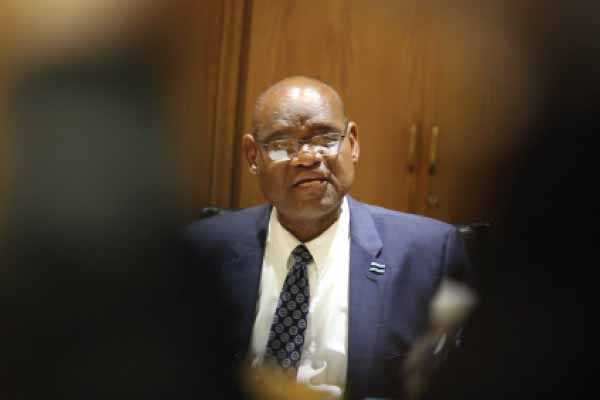Strong global growth to prop-up Botswana
Bank of Botswana executives are optimistic the economy will expand at a much higher rate in 2018 after taking a knock last year, as a result of positive sentiments both locally and globally, Botswana Guardian has heard.
This came out clearly at a press conference which was meant to announce Monetary Policy Committee's (MPC) decision on the benchmark rate, which has been maintained at 5 percent for the third time this year. But what is making central bank’s head honchos buoyant on the economic performance while rainfalls have been recorded above normal levels, made even worse by falling disposable income within the working as well as muted consumer confidence in the country and an increasingly protectionist mentality by Donald Trump United States ?
Bank of Botswana Governor Moses Pelaelo and the bank’s director, research and financial stability, Dr Kganetsano Tshokologo are adamant that the economy will pick to levels higher than last year as a result of improved economic conditions here and elsewhere.
Responding to a Botswana Guardian question on why they are buoyant, Tshokologo stated that economic conditions suggest that the global economy will grow even better than predictions made by International Monetary Fund (IMF) early in the year. In January, the Washington based Fund uplifted its global economic projection by 0, 2 percent to 3, 9 percent, arguing that ‘momentum is building in global economic activity and Donald Trump’s tax cuts in the US are likely to stimulate activity further’.
Global growth is important for Botswana’s economy as the mineral rich country depends on consumer confidence in developed countries which have the ability to purchase luxury goods such as diamonds. De Beers, a joint venture between Botswana and Anglo American sells most of its diamonds mined in Botswana to United States of America, China and India. De Beers is also pinning its hope on synthetic diamonds for its revenue going forward. For the first time the company will start making synthetic diamonds for the retail business this September. Botswana supports the latest move by the world Number 1 rough diamonds producer.
The other reason why the country's Gross Domestic Product (GDP) is expected to expand further this year because as the economy improves in developed countries, the tourism industry in Botswana also benefits, said Kganetsano. Tourism is one of the biggest contributors to national GDP. There are other sectors which will pick Botswana’s economy this year, stated Pelaelo in a prepared speech this Tuesday. “GDP is projected to expand at a faster rate in the short-to-medium term, driven largely by growth in the services sectors and recovery in mining activity, in line with the positive global economic prospects,” said the Governor.
Furthermore, the projected accommodative monetary conditions in the domestic economy and expansion in government expenditure, as well as relative stability in water and electricity supply, are expected to support economic activity in the non-mining sectors. Overall, the economy is expected to operate close to but below full capacity in the medium term. Water and electricity sectors which have in the past dragged down the economy, have now stabilised and this will be critical to support other sectors of the economy such as manufacturing and construction. Finance and Economic Development minister, Kenneth Matambo has stated the economy will grow by 5, 3 percent this year on the backdrop of improved diamond industry.
Two weeks ago, IMF economists visited Botswana and also came to the conclusion that, the economy will bounce back. “In 2018, economic growth is expected to rebound supported by higher diamond sales, a stable macroeconomic environment, and higher government spending,” said the team. Meanwhile, IMF has advised the MokgweetsI Masisi-led government to remove many tax exemptions, increase property taxation and consider making the personal income tax more progressive.
“On the expenditure side, it will be important to contain the growth of recurrent spending, improve the efficiency of social programs, and protect public investment while prioritising projects with the highest payoffs. In addition, the financial sector can be further developed to intermediate additional savings and lend to productive sectors by strengthening creditors’ rights, improving information on borrowers’ creditworthiness, increasing the issuance of government bonds to develop a reliable yield curve, and promoting mobile payments,” said IMF economists.
The diversification and job creation efforts requires focus on prompt and bold market friendly reforms that can reduce the costs of doing business, improve skills in the labor force, make the public sector more efficient, privatise key enterprises, and enable competition and entry of firms in sectors with latent comparative advantage.






